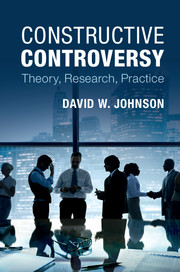Book contents
- Frontmatter
- Contents
- List of figures
- List of tables
- Acknowledgments
- 1 Underlying foundations of constructive controversy
- 2 The nature of constructive controversy
- 3 Theory of constructive controversy
- 4 The processes of constructive controversy and concurrence seeking
- 5 The outcomes of constructive controversy
- 6 Conditions mediating the effects of constructive controversy
- 7 Constructive controversy and decision making
- 8 Constructive controversy in education
- 9 Constructive controversy and political discourse in democracies
- 10 Constructive controversy, creativity, and innovation
- 11 Constructive controversy and building and maintaining peace
- 12 Conclusions
- References
- Index
12 - Conclusions
Published online by Cambridge University Press: 05 June 2015
- Frontmatter
- Contents
- List of figures
- List of tables
- Acknowledgments
- 1 Underlying foundations of constructive controversy
- 2 The nature of constructive controversy
- 3 Theory of constructive controversy
- 4 The processes of constructive controversy and concurrence seeking
- 5 The outcomes of constructive controversy
- 6 Conditions mediating the effects of constructive controversy
- 7 Constructive controversy and decision making
- 8 Constructive controversy in education
- 9 Constructive controversy and political discourse in democracies
- 10 Constructive controversy, creativity, and innovation
- 11 Constructive controversy and building and maintaining peace
- 12 Conclusions
- References
- Index
Summary
INTRODUCTION
When controversy is suppressed and concurrence seeking is emphasized, several defects in decision making and problem solving will appear (Johnson & Johnson, 2007). When NASA, for example, decided to launch the space shuttle Challenger on January 28, 1986, engineers at the company that makes the shuttle's rocket boosters (Morton Thiokol Company) and the company that manufactures the orbiter (Rockwell International) had opposed the launch because of dangers posed by the subfreezing temperatures. The Thiokol engineers feared that the cold would make the rubber seals at the joints between the rocket's four main segments too brittle to contain the rocket's superhot gases. Several months before the doomed mission, the company's top expert had warned in a memo that it was unknown as to whether the seal would hold, and that if it failed a catastrophe of the highest order would result (Magnuson, 1986). The night before the launch, the engineers argued for a delay in the launch with their managers who were uncertain and the NASA officials who wanted to launch on schedule. The NASA managers made a coalition with the Thiokol managers to shut the engineers out of the decision making, giving an illusion of unanimity. Since the engineers could not prove there was danger, they were silenced to give an illusion of invulnerability. The Thiokol engineers were pressured to conform. One NASA official complained that the engineers would not want to OK a launch until spring. Finally, to “mind-guard,” the top NASA executive who made the final decision to launch was never told about the engineers’ concerns, nor about the reservations of the Rockwell managers. Protected from the disagreeable information, the NASA official confidently gave the order to launch the Challenger on its tragic flight. The Challenger exploded soon after takeoff, killing everyone aboard, including a teacher who had won a national contest to be the first teacher in space.
- Type
- Chapter
- Information
- Constructive ControversyTheory, Research, Practice, pp. 201 - 208Publisher: Cambridge University PressPrint publication year: 2015



